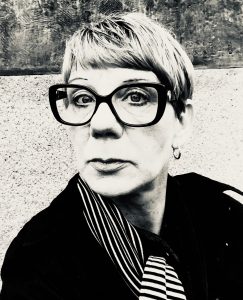

SPARKLING VISLU RESEARCH
To become a future-ready teacher!
Visual artist Linn Hurtta, Konstfack MA student in Arts Education in dialogue with researcher Hannah Kaihovirta.
Artists’ practice is about shifting perspectives, making alternative realities, and expanding the space for sharing experiences and collaboration. Artistic processes often contain akin to play where intuitive creativity can generate possibilities to re-imagine ingrained patterns.
When doing educational research, artistic processes aren’t necessarily the first choice as research method and the outcomes are neither necessary the ones expected. However, artistic processes entail perspectives central for learning, and learning is a school ontology.
In November 2023 the VISLU researchers Solveig and Hannah met artist Linn at a café in Helsinki. One unexpected outcome from the meeting was a turn in the VISLU research approach. In the original VISLU research design still photos taken by student teachers in their final internship were planned to be analyzed through visual methods. When meeting Linn, we decided to add a further layer of analysis and asked her to contribute to VISLU with an art-informed interpretation of the data.
Linn was positive to our suggestion, and VISLU invited her to generate an interpretation through a visual video essay. In the VISLU research blog March 24 we share the dialogue Linn (L) and Hannah (H) had on the ongoing process:
H Dear Linn! I’m excited to hear about your process. In November we invited you to be part of a very open ended process and challenged you to make brave and independent artistic decisions in a creative process working with still photo data we shared with you.
L It has been great. The photos sparked something in me, and I’ve been pouring myself into the material ever since I’ve got it. I also started my own video diary during my internship that is going on alongside when I’m working with the video essay.
H I think it is crucial, and I also think it is impressive and ambitious of you to channel your working process into your own learning during your internship. How do you feel about combining your own experiences with the interpretation process of the still photos from the student teachers?
L It’s been a bit of a balancing act, to be honest. I’ve found myself questioning how much of my interpretation should come from the students’ photos of their identity construction versus my own experiences. My intuition says that I should trust my artistic impulse and follow what feels right for me.
H I’m delighted to hear that. You are right in to the core of the dilemma and possibilities of combining artistic ambition, research goals and educational intentions. Educational research aims to be generative. Your artistic process is unique to you, and it’s essential to honor. While the initial inspiration from the photos is valuable, what matters most in the visual video essay is how you shape your story.
L I’ve been experimenting with different approaches. I also discovered that there is a great sense of humor to be used for creating an atmosphere in the video. I feel like I’m starting to find my way.
H That’s wonderful. Humor is often underused as a learning resource in school. For example, carnivalism and clowning are essential parts of creative work. Humor can generate completely unexpected ways to rethink school and learning experiences and your future teacher identity.
L Humor is necessary in school! Students bond with each other through humor. During my internship I have seen a lot of the students’ meaning making worlds emphasizing humoristic underlining.
H Thank you for sharing your insights with us. Your reflections are substantial when exploring what visual literacy can provide teacher education.
L It’s really rewarding and validating to know that I’m on the right track with my artistic process.
H Keep on exploring, experimenting, and staying true to yourself! I have no doubt that you’ll produce something unique.
L I’m excited to see where this takes me and how I can continue to develop as an artist and a future art teacher.
Finally, doing research together with an artist follows the inner logic of art and its possibilities for learning. VISLU research turn is about to go beyond standards and together with an artist approach research themes beyond the expected. We are honored of being in a process that corresponds to the artistic ambition and vision of Linn and surely excited to move forward on creating research spaces where we can state that the combination of art, visual literacy research and education is about to touch the future.







